Three Wishes
categories: Cocktail Hour / Reading Under the Influence
4 comments
“I always labour at the same thing, to make the sex relation valid and precious, instead of shameful. And this novel is the furthest I’ve gone. To me it is beautiful and tender and frail as the naked self is.”
D. H. Lawrence (re: Lady Chatterly’s Lover)
#
Sorting books recently I found all sorts of old lost favorites in various categories from juvenilia to biography to popular science to spiritual to gardening and on and on, none so nostalgic as Candy by one “Maxwell Kenton,” really Terry Southern, a film writer mostly, working with his friend Mason Hoffenberg. My copy (not my first, which was an original Olympia Press edition, much pawed in my early teenage years: a genuine dirty book) is a Canadian edition with Marlon Brando and Ewa Aulin on the cover—he’s playing the phony guru, she the naïf. The movie’s not great, but the book is pretty funny, meant as a spoof, and in 1968 (in an era when porn was hard to come by and I fifteen) it was a turn-on, frequently referenced. Southern and his friend took turns writing chapters, and the chapters get more and more absurd as the book goes along, ending with poor, gorgeous Candy pinned in the rubble of a Buddhist shrine with Buddha’s great stone nose between her legs—no one, not even the gods, can resist her.
About the same year I discovered the Grove Press edition of The Pearl which collected issues of “The Pearl,” a Victorian journal devoted to what’s called literary erotica, but in this case is certainly porn, much of it devoted to what can only be called S&M, but at least some devoted to various sexual coming-of-age stories in the most lurid style, graphic as can be. There’s also a smirky smattering of dirty limericks and other poetry, also filthy fables (“MORAL: Never Suck a Dildoe” [sic]), and a number of serialized novels with titles like “Sub-umbra, or Sport Among the She-Noodles,” and “La Rose D’Amour,” and “My Grandmother’s Tale, or May’s Account of her Introduction to the Art of Love,” and “Young Be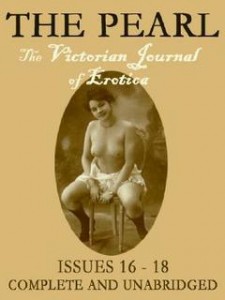 ginners.” I favored the last of these, as I was a young beginner myself, and those pages weren’t quite as perverse as the others. I’d had the impression from school that the Victorian era was a time of attention to high morals and proper behavior, but “The Pearl” gives the lie to that! My god, does it ever! The subtitle, “A Journal of Facetiae and Voluptuous Reading,” kind of fudges it. The language and intent feel kind of fresh to me still, like something you’d find in The Harvard Lampoon, or other such high-minded pages, nothing quaint about it. There are dildos here, all right, and battledores used as dildos and tribadism (and of course tribades), and quims and cunnys and pegoes and pricks and delight, always delight, with frigging and Cupid’s battering ram and Mr. Priapus, lots of copious “spending” by men and women alike. And nuns and whips and, well, on and on. Most of it shocked me silly at fifteen, sixteen, but on the other hand I learned a few things from it, and what more noble result of the pursuit of literature? My copy, still extant as it turns out, is deeply yellowed on poor paper and falling apart and as I thumb through it even now I find I recall whole titillating passages and sections, and even now have the urge to hide it lest my parents find it! And written c. 1879!
ginners.” I favored the last of these, as I was a young beginner myself, and those pages weren’t quite as perverse as the others. I’d had the impression from school that the Victorian era was a time of attention to high morals and proper behavior, but “The Pearl” gives the lie to that! My god, does it ever! The subtitle, “A Journal of Facetiae and Voluptuous Reading,” kind of fudges it. The language and intent feel kind of fresh to me still, like something you’d find in The Harvard Lampoon, or other such high-minded pages, nothing quaint about it. There are dildos here, all right, and battledores used as dildos and tribadism (and of course tribades), and quims and cunnys and pegoes and pricks and delight, always delight, with frigging and Cupid’s battering ram and Mr. Priapus, lots of copious “spending” by men and women alike. And nuns and whips and, well, on and on. Most of it shocked me silly at fifteen, sixteen, but on the other hand I learned a few things from it, and what more noble result of the pursuit of literature? My copy, still extant as it turns out, is deeply yellowed on poor paper and falling apart and as I thumb through it even now I find I recall whole titillating passages and sections, and even now have the urge to hide it lest my parents find it! And written c. 1879!
Much better sex scenes have been penned since, of course. I can’t find my copy of “Endless Love” by S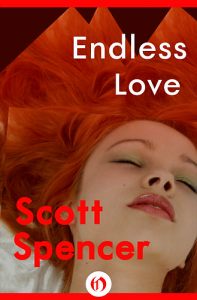 cott Spencer, published in 1979. A poor movie was made of it, but the book is a charming love story. It’s also about one-third a single sex scene, and unlike Candy, above, and unlike “The Pearl,” it hews to D.H. Lawrence’s dictum, also above, and the dictum of Edward Hower, one of my writing teachers, that sex in fiction should delineate character.
cott Spencer, published in 1979. A poor movie was made of it, but the book is a charming love story. It’s also about one-third a single sex scene, and unlike Candy, above, and unlike “The Pearl,” it hews to D.H. Lawrence’s dictum, also above, and the dictum of Edward Hower, one of my writing teachers, that sex in fiction should delineate character.
An interruption: Lady Chatterly’s Lover is very sexy. And full use of the language, too. I read what must have been an abridged edition in college, because it had no sex in it at all, just the suggestion that something was about to happen, or that something had happened, which is how way too much sex is written these days, like we’re all watching a TV set while we’re reading and the FCC is watching us. Doors get closed, space breaks are employed, silky slips drop to the floor and you’re on to the next chapter. I gave college kids the assignment to write sex scenes, just to get them to put some life on the page, and they really had trouble doing it. I mean the writing, not the it. The scenes were either Harlequin heaving or Penthouse Letter throbbing, nothing of the real world to be seen, never a fragrance or disappointment. But it was surely fun having them read their exercises to the class. The next assignment was to write the same scene from the other point of view, the other person involved, and that’s when things took off. Men didn’t come off too well in all this, I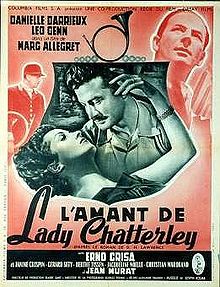 must say. Anyway, I borrowed a tape of Chatterly from the Colby Library when I was visiting prof there and listened commuting. Judy Dench read. And all those old English words were there, fucks and cunts and so forth. Delicious to hear the great actress’s voice grow husky and intimate in the beautifully guilty and lubricious atmosphere Lawrence created in my car, back and forth to Waterville.
must say. Anyway, I borrowed a tape of Chatterly from the Colby Library when I was visiting prof there and listened commuting. Judy Dench read. And all those old English words were there, fucks and cunts and so forth. Delicious to hear the great actress’s voice grow husky and intimate in the beautifully guilty and lubricious atmosphere Lawrence created in my car, back and forth to Waterville.
So, anyway, my memory is that nearly a third of Endless Love is a single sex scene between two young lovers who’ve all but broken up and it’s life itself, this scene, every unspoken thing between two people expressed in the sweat and blood of their bodies, really, really lovely and really sweet in the end, a long brave, unflinching and very kind of smoking portrayal, one that brings the reader’s very arousal to bear.
Another favorite literary-sexual moment is in A.S. Byatt’s novella “The Djinn in the Nightingale’s Eye,” which I first read in the Paris Review, early nineties. I brought that story whole into a dull writing seminar, 120 pages, and r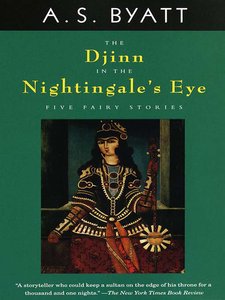 ead the entire thing to them in a three-hour class period, all because a kid had said he found fiction boring. In the story, a rather shut-down academic woman nearing fifty finds a magic bottle in a bazaar in Turkey and rubs it to clean it a little—foof, here comes a genie! But not till deep into the story! And every page up to that fascinates, no genie necessary. And then there he is. He has to size himself and this takes a while, his genitals almost filling the room till he adjusts properly. The professor gets three wishes, of course (with some rules—you can’t ask for endless wishes more, for example). Her first wish it to have the body she had not when she was 16 or 25, but when she last liked her body, sometime in her thirties, a wonderfully modest and subtle wish, which is granted. Her next wish is to be loved. “I love you,” the genie says, and he means it. They embark on the hottest possible affair, as genies are extremely gifted lovers. And indeed they are deeply in love, no irony here. But the genie wants to be free of his eternal bottled exile, the only wish he’d ever have for himself, not that he’s ever going to receive any wishes. For the protagonist’s last wish, she frees him, selfless person, thus granting his wish. Which I can give away since there’s so very much more to the story.
ead the entire thing to them in a three-hour class period, all because a kid had said he found fiction boring. In the story, a rather shut-down academic woman nearing fifty finds a magic bottle in a bazaar in Turkey and rubs it to clean it a little—foof, here comes a genie! But not till deep into the story! And every page up to that fascinates, no genie necessary. And then there he is. He has to size himself and this takes a while, his genitals almost filling the room till he adjusts properly. The professor gets three wishes, of course (with some rules—you can’t ask for endless wishes more, for example). Her first wish it to have the body she had not when she was 16 or 25, but when she last liked her body, sometime in her thirties, a wonderfully modest and subtle wish, which is granted. Her next wish is to be loved. “I love you,” the genie says, and he means it. They embark on the hottest possible affair, as genies are extremely gifted lovers. And indeed they are deeply in love, no irony here. But the genie wants to be free of his eternal bottled exile, the only wish he’d ever have for himself, not that he’s ever going to receive any wishes. For the protagonist’s last wish, she frees him, selfless person, thus granting his wish. Which I can give away since there’s so very much more to the story.
I looked up when I finished reading to the class and the young man in question said, “That was not boring.”

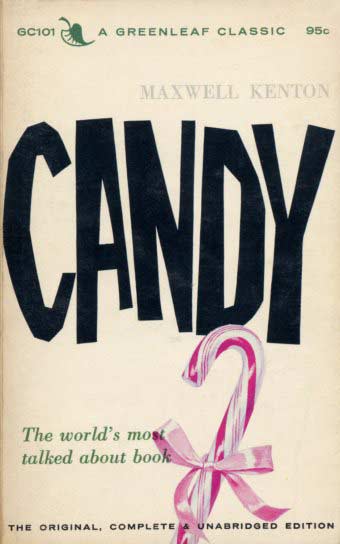

Kundera’s Unbearable Lightness of Being comes to mind regarding literary versus cinematic eroticism. The simple change of the neurosurgeon’s command of “strip” in the book to “take your clothes off” in the movie is profound.
Of course, for me, Daniel Day-Lewis as a neurosurgeon with a Czech accent asking me to take my clothes off (OK, so it was Lena Olin, a girl can dream) is just too many kinds of right, so I got over the substitution. TMI?
no, Pat, not TMI… Love Kundera–and would love to get favorite books and scenes from everyone!
This is my favorite Bill and Dave post yet.
A man after my own heart, or wherever this stuff is located!